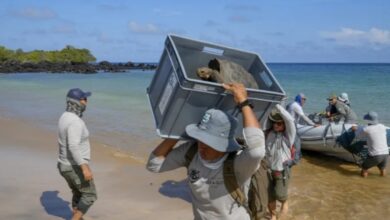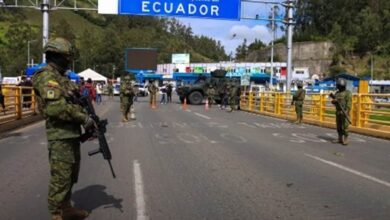The reasons why Guillermo Lasso won the presidential elections in Ecuador
Since 2005, a right-wing candidate has not won in the Andean country .

He competed against Correa, almost beating Moreno and defeating Arauz with 52.5% of the valid votes, against 47.5%. Photo: TW-LassoGuillermo
LatinAmerican Post | Santiago Gómez Hernández
Listen to this article
Leer en español: Los motivos por los que Guillermo Lasso ganó la elecciones presidenciales en Ecuador
Guillermo Lasso, a 65-year-old former banker, will be the new president of Ecuador. His victory came in the second round, defeating the correista Andrés Arauz. And as the saying goes: the third time's a charm. Lasso had already tried to reach the Carondelet Palace twice. He competed against Correa, almost beat Moreno and now he defeats Arauz with 52.5% of the valid votes, against 47.5%.
Juntos lo logramos, hoy ganó el Ecuador.
¡GRACIAS! ???????? pic.twitter.com/atEakuphRy
— Guillermo Lasso ???????? (@LassoGuillermo) April 12, 2021
Lasso will receive the Andean country at a difficult time, not only because of the pandemic that has affected all the economies in the world and especially the countries of the region but also because the Ecuadorian economy contracted 7.8% last year and the Estimated for 2021 do not exceed the growth of 3.5%.
Also read: Elections in Ecuador: Arauz and Lasso face off for the presidency
Thus, Lasso takes charge of a country with an external debt of 65.33% of GDP and with a majority opposition National Assembly. The president-elect will only have (initially) 12 seats won by his CREO party, plus 18 from the allied PSC movement, in a 137-seat unicameral parliament. With the defeat in Congress, the question is, how did Lasso manage to win over the voters who did not support him in the first round ?:
Rejection of Rafael Correa
Lasso's victory, more than an endorsement of the national right, is a rejection of the correista left. Despite the fact that Andrés Arauz, Lasso's rival and former President Rafael Correa's ward, won the first round, and that third place went to Yaku Pérez and his indigenous left, voters preferred to opt for the candidate who was moving away by the ex-ruler.
The ten years of the leader of the Movimiento Revolucionario Ciudadana party created a large base of electoral support, but also a large base of enemies and political detractors, not only from the right.
“No es un final sino un comienzo”, ha dicho Andrés.
Gracias a todos por su apoyo. Sinceramente creíamos que ganábamos, pero nuestras proyecciones eran erradas.
Suerte a Guillermo Lasso, su éxito será el de Ecuador.
Solo le pido que cese el lawfare, que destruye vidas y familias.— Rafael Correa (@MashiRafael) April 12, 2021
Additionally, as soon as he ceded his power to Lenin Moreno (who was his ally and later his political enemy), Correa had to face several criminal charges against him. He even faces an 8-year prison sentence for corruption, which he classifies as "political persecution."
Neutrality of Yaku Pérez
The leader of the Pachakutik party, Yaku Pérez, who came in third place, less than 50,000 votes away from Lasso, played an important role by refraining from tipping the balance for either of the two candidates who went to the second round.
Elecciones Ecuador 2021: Voto nulo sin precedentes con 38% escrutado apunta a factor Yaku Pérez https://t.co/1W4GPoc067
— El Comercio (@elcomercio_peru) April 12, 2021
Given the narrow margin that separated him from Lasso, Pérez insisted on possible fraud and decided to start a campaign for the null vote in the second round, by way of rejection of the 2 candidates.
Arauz's alleged links with the ELN
Among the main attacks that Andrés Arauz's campaign received were his possible ideological and political links with the Colombian ELN guerrilla. The Colombian prosecutor's office (which controls a personal friend of the right-wing president Iván Duque) shared with his Ecuadorian counterpart information that would evidence alleged financing of the illegal group and the campaign of the socialist leader.
Jaime Durán Barba asesor de Guillermo Lasso comenta sobre el supuesto aporte del ELN a la campaña del candidato Andrés Arauz :
– "Para mí, esa acusación que le hicieron a Aráuz de que estaba financiado por el ELN, es una idiotez total". pic.twitter.com/7BcBtZgOH8— Guayaco C. (@Guayaco__2020) April 4, 2021
This is not the first time that the Colombian government or state incriminates socialist leaders and politicians with illegal armed groups. Several years ago, former President Álvaro Uribe assured that they had information linking Rafael Correa's government with members of the FARC. This, after the Colombian Army, killed one of the top guerrilla leaders in Ecuadorian territory (without notice or permission from the Correa administration), which triggered one of the diplomatic (and even military) tensions in the region in the last years.
Lenin Moreno's legacy
Another element that influenced the electoral results in Ecuador was Moreno's legacy. Despite the fact that Moreno was Rafael Correa's vice president, ally, pupil and candidate, after coming to power, he distanced himself from his former boss and became one of his strongest rivals.
This confrontation divided the Ecuadorian left, which is one of the strongest in the region. Additionally, Moreno's low popularity led both Arauz and Lasso to insist that the current president was closer to or an ally of the other candidate.
Main defeated
Arauz was evidently the personification of the traditional Latin American left. Correa's sponsorship made him a potential ally of the socialist governments of the region (Bolivia, Argentina, Nicaragua, and, above all, Venezuela).
Mainly, Maduro does not find a strategic ally that could help him get out of the diplomatic pressure that he has been feeling, but from which he is already breathing step by step.
As Quito is the headquarters of Unasur, the presidency of Ecuador fulfills a symbolic role in the Latin left. This leaves a Unasur and, also, Prosur weak without having a large number of governments.
However, Lasso had already expressed his intention for Ecuador to join the Pacific Alliance, a trade and integration organization between Mexico, Colombia, Peru, and Chile.





